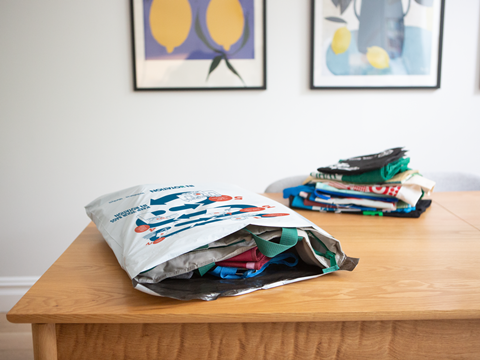
Returnity aspires to maximize the lifespan of reusable shopping bags with In Rotation, a new service allowing consumers to return extra reusables for further use.
The company fears that more reusable bags are in circulation than necessary, with an estimated 10 billion produced last year. A surplus of reusables could continue generating waste and generate the environmental impact they are designed to avoid.
In Rotation aims to avoid this by putting unused bags back into the consumer cycle. It provides consumers with a prepaid mailer to return excess grocery store totes and bags after use. If they are still in good condition, they are sent to qualified partners for reuse; anything unsuitable for further use is said to be responsibly recycled.
The system charges a $20 fee to cover the costs of logistics, sorting, and recycling or reuse. Retailers are also encouraged to pay a ‘nominal fee’ to install an In Rotation bag collection bin at their facilities – enabling consumers to return unneeded bags while also contributing to their own ESG goals.
Returnity CEO Mike Newman cites his previous work developing take-back programmes for mobile phones on behalf of Walmart, AT&T, Verizon, and other brands as the inspiration behind In Rotation.
“Reusable bags seemed like an ideal solution to the single-use bag problem, but their widespread adoption only created a different waste issue,” Newman explains. “In Rotation aims to balance the scales by empowering consumers and retailers to actively participate in circularity.
“There are already more than enough reusable bags in circulation. In Rotation supports our commitment to the circular economy and invites everyone to be part of a practical solution. It’s about doing what we can with what we have to drive truly meaningful change.”
Also aspiring for a reusable shopping bag solution, Iceland Foods has turned Paptic’s wood fibre-based material into a moisture-resistant, recyclable carrier bag. It is thought to utilize 40% less raw materials than other strong paper solutions.
Other developments from Returnity include The Last Box, which was released last year as a reusable replacement for 50 cardboard boxes and 300 feet of packing tape each time. It sought to phase out an estimated four million cardboard boxes in retailers’ internal operations in 2023.
Apparel company Vuori later adopted The Last Box for merchandise shipments to its retail stores in the USA.
If you liked this story, you might also enjoy:
How are the top brands progressing on packaging sustainability?
The ultimate guide to global plastic sustainability regulation














No comments yet